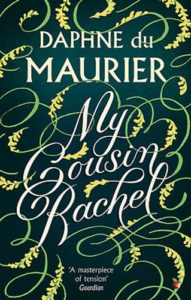Decades: Compiling the Ultimate Library with Mathew West
Welcome to Decades. For the last 12 months I have been on a mission to assemble a brand new library of wonderful books. I started this challenge in January 2021 with the question: If you had to build a new library from the ground up (and zero books) which unmissable books should I add to the library shelves?
This was a challenge I could not have undertaken alone, so each week I invite a guest to help me put books onto the shelves of my Decades Library. Why do I call it a Decades Library? That derives from the two rules which govern the selections my guests make:
Rule 1 – Choose Any Five Books
Rule 2 – You May Only Select One Book Per Decade From Five Consecutive Decades
Easy? I am told narrowing down to five books is tricky. But it’s rare someone’s first five selections fall into five consecutive publication decades and from that point the gnashing of teeth begins as my guests decide which books they need to swap out.
This week it is my absolute pleasure to welcome Mathew West to Grab This Book. Mathew is the author of the terrific chiller-thriller The House of Footsteps which published this week.
DECADES
 Mathew West is an author. His debut novel The House of Footsteps is a gothic mystery-thriller set in the 1920s in a foreboding house on the English-Scottish border, and was released on 3 February 2022 by Harper North.
Mathew West is an author. His debut novel The House of Footsteps is a gothic mystery-thriller set in the 1920s in a foreboding house on the English-Scottish border, and was released on 3 February 2022 by Harper North.
He lives in Edinburgh where he spends most of his time writing, listening to music that could generously be described as “eclectic”, watching bad horror films and walking around graveyards.
The House of Footsteps can be ordered here: https://www.amazon.co.uk/gp/product/B098M7DD71/ref=dbs_a_def_rwt_bibl_vppi_i0
1950s – My Cousin Rachel – Daphne du Maurier
I think that I have to start with a du Maurier, as she is such a huge influence on my own writing. I was tempted to pick Rebecca, of course, but that would have messed up my sequence of decades, so instead I have the chance to champion Rebecca’s slightly less-famous sister novel, My Cousin Rachel.
It’s a pretty straightforward setup: a young, slightly naive chap is beguiled by the widow of a beloved cousin – but does she really care for him, or is she after something else? Du Maurier does what she does best and draws her characters into ever-tightening webs while you read on, thinking that you know where it’s all going without ever quite being certain. At the centre of it all is Rachel herself – she’s constantly mysterious, enchanting and aloof, a woman born out of time who knows what she wants and isn’t afraid to go after it. The characters of Rachel and Ambrose and their mercurial relationship were never far from my mind as I created Amy and Simon in The House of Footsteps.
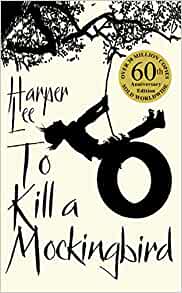 1960s – To Kill a Mockingbird – Harper Lee
1960s – To Kill a Mockingbird – Harper Lee
When I was about 14 my secondary school English class were allowed to choose between reading To Kill a Mockingbird, or Nineteen Eighty-Four. Most of the boys, myself included, opted to read the sci-fi tinged, anti-authoritarian Nineteen Eighty-Four – which I absolutely adored. But over the next several weeks we could also listen in as the rest of the class read and discussed their selection. I was fascinated by the snippets I overheard about Scout, Gem and Atticus Finch, Tom Robinson and Boo Radley. Fascinated enough that I read the book myself, at home, making this I think the first ‘serious’ novel I selected from my parent’s bookshelf and read purely for my own pleasure.
What else is there to say about To Kill a Mockingbird? Superlatives can’t do it justice. It’s a gift, and essential reading for anyone.
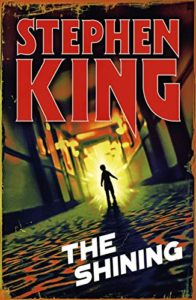 1970s – The Shining – Stephen King
1970s – The Shining – Stephen King
To be totally honest I’m picking this as much for the film as the novel. They’re quite different, and having loved the film for many years I was amazed to finally read the book and discover that many of the most iconic scenes on screen don’t appear in the original text at all. Not that King’s book is lacking terrifying set pieces, of course.
There’s something so compelling about the chilling locale of the Overlook Hotel, its grisly and perverse past, and the inevitable slide towards history repeating itself when the Torrence family stay there alone over a long winter. Some of the best bits in the novel are where Jack battles the inner demons of his past, even more dangerous and irresistible than the very real spirits of the Overlook – it’s an internal torment that the film can’t quite do justice to.
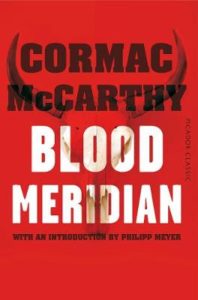 1980s – Blood Meridian – Cormac McCarthy
1980s – Blood Meridian – Cormac McCarthy
The Shining may have been (arguably) improved by its big screen adaptation, but this is a book I hope no one ever tries to put on film. It’s a shocking, appallingly violent ‘anti-western’ that not only deconstructs but destroys the Hollywood myth of the Old West. The murders and mutilations begin almost from the first page – seriously, it’s not for everyone.
It’s brutal, bleak and harrowing, and made all the worse given it’s partly based on real events. But there’s also a strange beauty to the whole thing. McCarthy’s writing is almost shamanistic, in the landscapes he describes and the mystical, savage characters that inhabit them – most of all the enigmatic and terrifying Judge Holden. It’s not an easy novel, but immerse yourself in it and it will stick with you, like blood on the sole of your shoe.
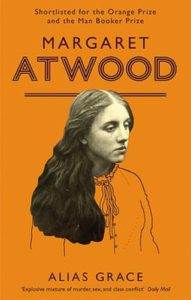 1990s – Alias Grace – Margaret Atwood
1990s – Alias Grace – Margaret Atwood
Another novel based loosely on real events, in this case the sensationalised 19th century murders of a young landowner and his housekeeper. But this isn’t a whodunnit: the Grace of the title has already been convicted for the killings. In telling Grace’s story Atwood has a huge amount to say about class, gender and the immigrant experience. Like My Cousin Rachel, in many ways this is the tale of what happens to a woman who tries to find her own path in a world weighted against her. But what I love most is the fluid, uneasy storytelling. The perspective shifts from Grace – the quintessential unreliable narrator, either mad or lying through her teeth to save her skin – and the doctor listening to her unbelievable story, who is sympathetic but too clouded by his own privilege to really understand. The ambiguity and unanswered questions might leave some a little frustrated, but (as I think this list shows!) I absolutely love a mystery that keeps you guessing, and my favourite evils are the ones which can never truly be understood.
And that’s my selection! I’ve had a lot of fun choosing, and it’s been an interesting challenge to spread my picks across the decades. I was surprised at how many of my absolute ‘must-have’ choices were published in the 1950s, as well as how few books from the 1970s I’ve actually read! I hope you’ve enjoyed reading this, and I’m really grateful for the chance to enthuse about some of my favourite books of all time – without which, it’s fair to say, The House of Footsteps would never have been written.
Decades can share some familiar names but unexpected books and Mathew has introduced me to two titles I had not previously heard of from authors I instantly recognise. It’s the dream combination of recognition and discovery and a perfect illustration of why I love sharing these posts.
Thank you to Mathew for taking time to make his selections. I would urge everyone to seek out his book, The House of Footsteps, which published yesterday from Harper North.
DECADES WILL RETURN
